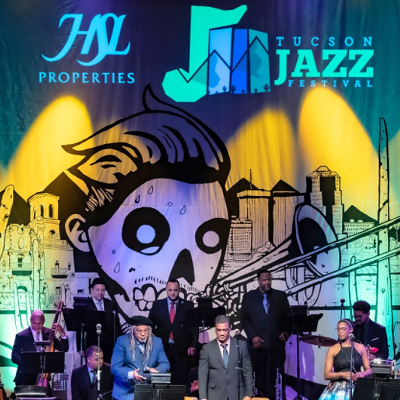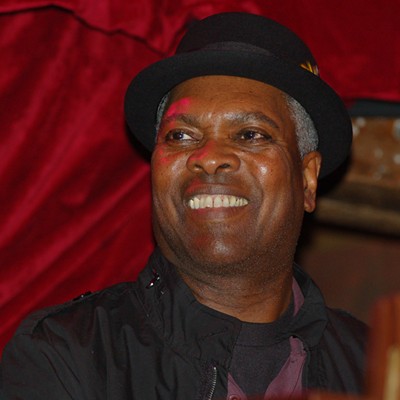Makes sense, though, doesn't it? It takes some serious strength and endurance to maintain that column of air in your horn while wrestling with a complex, extended solo. Especially when--at the risk of mixing metaphors--the player is at the eye of a free jazz storm.
For almost four decades, the English saxophonist Evan Parker has been a recognized monster, capable of riding and even controlling hurricanes of improvisational jazz music.
Now on a rare American tour, Parker will play Thursday, May 8, at the Mat Bevel Institute. The gig marks the season finale of Zeitgeist's Jazz at the Institute series.
Parker will play tenor and soprano saxophone in a trio setting, accompanied by a pair of longtime collaborators: pianist Alexander von Schlippenbach and drummer Paul Lytton.
This is only the fourth full-fledged concert tour of the United States during Parker's career, he said during a recent interview from his hotel room in Chicago.
And with the trio out in America for four weeks, he and his fellow musicians are trying to see the country, he said.
"It's not a huge money-making venture. On this tour, we definitely set out to see different parts of America, more so than we have on other tours. We're really driving a lot of miles, except for when we get into Canada, when we have to send the car back to New York."
While Parker and his crew are renowned in Europe, Australia and Japan, sometimes playing to hundreds of fans at a time, they are more akin to cult heroes in the United States. In this country, unless you're in the bigger cities, free jazz isn't the most popular commodity.
But Parker knows where to find the true believers on this tour.
"Well, there is a network of people associated with the music. Sometimes it's hard to make all the places and meet all the contacts because of logistics and date conflicts. But we try to make it to all the places where that little network reaches."
And interest has increased enough on these shores to attract artists of Parker's stature. "It does seem to be more possible now for European improvisational musicians to come here and play. I think I was among the first, if not the first, to come over here and play in 1978."
Parker's interest in jazz extends back to his schoolboy days. Born in 1944 in Bristol, he started playing alto sax at 14, a devotee to the music of Paul Desmond. By 1960, Parker had switched to playing tenor and soprano, in the fashion of his idol, John Coltrane. Later, Parker would say that Coltrane determined "my choice in everything."
When he was a botany student at Birmingham University during the early 1960s, Parker took a trip to New York City and heard for the first time the trio led by pioneering pianist Cecil Taylor. It was another defining moment, he said.
When he first heard the music of Coltrane, Parker said, "It was like a huge wave that takes you up. It carries you somewhere and dashes you on the shore of a distant island."
As for the music of Taylor, he said, "Once on that distant island, another fierce wave picked me up and tossed me to the other side of the island."
By 1966, Parker had moved to London and was experiencing that city's burgeoning free-jazz scene. He played with the Spontaneous Music Ensemble, a now-legendary group that included drummer John Stevens, trumpeter Kenny Wheeler, bassist Dave Holland and maverick guitarist Derek Bailey.
Parker maintained a decades-long partnership with Bailey and formed the label Incus Records with him and Tony Oxley. But by the mid-1980s, Parker left Incus, the result of a falling out with Bailey that he still politely refuses to address.
Among Parker's other 1960s achievements was playing on the classic free-jazz recording Machine Gun by the German saxophonist Peter Brötzmann, a monster if there even was one. Of Brötzmann's sometimes-overwhelming playing, Parker said, "When I first heard Peter, I had never heard anybody make sounds like that come out of a tenor saxophone. And still haven't."
In the 1970s and '80s, Parker encountered many approaches to playing free jazz. He played often with Schlippenbach and occasionally in Wheeler's big band, as well as such with outfits as the Pierre Fauvre Quartet and the Dutch Instant Composers Pool (with Misha Mengelberg and Han Bennink). He played in small groups and large, no matter what the format, on a quest to satisfy his voracious hunger for new sounds, experimenting with avant-garde composers such as Anthony Braxton, Steve Lacy and George Lewis.
He has guest-starred on albums by pop artists such as Annette Peacock, Scott Walker and Charlie Watts. He has performed notated works by composers Gavin Bryars, Michael Nyman and Frederic Rzewski and continues to lead the much-respected Evan Parker Electro-Acoustic Ensemble.
"It wouldn't be a misinterpretation to say that I am largely driven by my own appetites and interests," he said. "But the way the music of the world is changing allows for us to explore every opportunity for making or listening to music."
In the late 1980s and '90s, Parker often had the honor of playing with his early heroes, such as Taylor, Rashied Ali (a drummer for Coltrane), Paul Bley and Ornette Coleman.
One of Parker's most recent collaborators is fellow saxophonist Joe McPhee, a Chicagoan with whom Parker recently recorded a duet album, Chicago Tenor Duets. In fact, the two horn men were scheduled to play a duo concert in Chicago a few hours after Parker spoke for this article.
Since the early 1990s, Parker also has explored the world of electronic music, working with a wide variety of knob-twiddlers, predominantly in live improvisational contexts.
Electronics being prohibitively expensive for this sort of concert tour, the Parker trio that hits Tucson, though, is an all-acoustic affair.
When originally announced, Parker's current tour was planned to have featured longtime bassist Barry Guy. But Guy's wife took ill, and Schlippenbach stepped in at the last minute. Seeing as Parker has been a member of Schlippenbach's trio for more than 30 years, the German pianist made the ideal replacement.
No matter what the format, Parker always looks for collaborators who share two traits: "Open mindedness and curiosity."
"To me, the exciting aspect of the evolution of improvisational music is the emergence of the global networks of musicians and music. Now, you can find a meeting ground among the music of most of the different cultures and countries; this is what marks or characterizes the music today, the efforts at seeking out new sounds and combinations of sound."
Today in music, anything is possible, Parker said, evincing no small amount delight.
"It's a very exciting time. It's an open sky, I think Sonny Rollins once said. The music can be taken anywhere."










